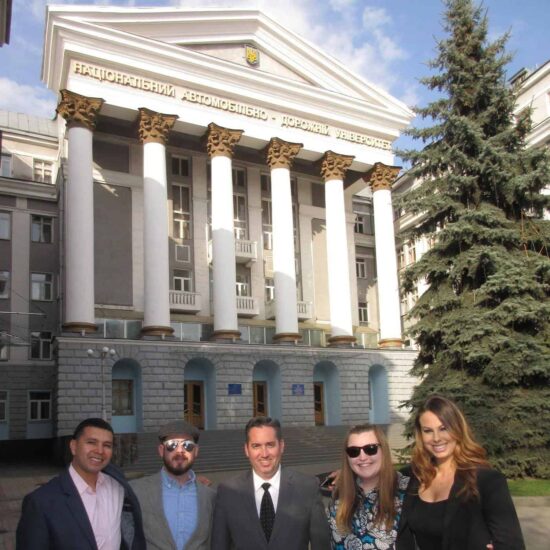Graduate Students Return From QEP Sponsored Ukraine Trip

The Quality Enhancement Plan (QEP) sent four political science graduate students to present research on United States and Ukraine relations at a conference in Ukraine in April.
Dr. Robert Rodriguez, assistant professor of political science, led the four students, Sarah Hays, Tyler Henderson, Ricardo Garcia, and Ashley Cotton, on a trip to Kharkiv to give two presentations at a conference held at the Kharkiv National Automobile and Highway University. Dr. Rodriguez took the students to significant historical, political, and cultural locations in Kyiv and Kharkiv.
The students started their research last September, meeting weekly to discuss their findings. They first presented their research in February in Buenos Aires, Argentina at the 2nd Pan-American Interdisciplinary Conference before presenting their updated research in April in Ukraine. The students' research focuses on how the United States has historically interacted with Ukraine diplomatically, with a look at how Russia also gets involved in the mix.
“We broke our research down into four sections, from the time that the Soviet Union fell in 1991 to the present day,” said Hays.
Garcia had the first section, going from 1991-1994, discussing Ukraine's transition from communism to democracy, and the first elected Ukrainian president and his ongoing negotiations with President George H.W. Bush and Bill Clinton. The second section was covered by Cotton, starting in 1995 and going to 2001 as Ukraine in some respects became a more democratic nation, Clinton's involvement in developing United States and Ukraine relations, and explaining Ukraine's corrupted system once George W. Bush became president. The third section was covered by Henderson, ranging between the years 2004-2010, and starting with Ukraine's pro-Western Orange Revolution and continuing through the point when President Obama took office in the United States. The fourth section was covered by Hays, whose research started with the dramatic anti-government protests in Ukraine in November of 2013 up through today's events.
“We were working so many months on this research, studying meticulously places of conflict, places of protest, and finally getting to go and seeing and being in real time in this place, and having our research come full circle; that was very interesting,” said Cotton. “Before this trip, many people were [asking us] either, ‘What is Ukraine?', ‘Where is Ukraine?', or [telling us] ‘Please be careful.' But it was so safe. I was very grateful that we were able to go and see the places that we were studying.”
“I am so proud of my students,” said Dr. Rodriguez. “They took an incredibly complex topic of international significance and received many accolades from the faculty and students that heard their presentation in Ukraine. Short versions of our studies have already been published in academic journals, and we fully expect to publish the long version of our study as a book in the upcoming year.”
The trip not only had a major impact on the students, but also had a major impact on the QEP program, as it was the first QEP sponsored trip to have cycled through since the program's start.
“The first round of funding for Global Fellows was awarded in fall of 2015,” said Dr. Shonda Gibson, executive director of institutional effectiveness and research, global learning and QEP. “Dr. Rodriguez was in the inaugural group to apply and be awarded QEP funding. His students are the first to have traveled and returned. What an honor to know that the university QEP has been able to support and encourage these students in their pursuit to be fully prepared for an interconnected world!”
The QEP is a plan to implement and assess a focused set of initiatives to improve student learning across the university with a focus on improved global competence.


